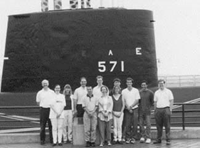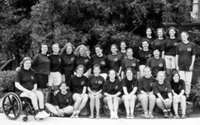Summer Is for Research:Students and REU Programs
January 22, 1999

Pictured here on a field trip to the USS Augusta, in Groton, Connecticut, participants in the 1998 REU program at Worcester Polytechnic Institute completed research projects in a wide range of mathematical topics. (Photograph courtesy of Arthur C. Heinricher, WPI)
While many undergraduates spend their summers parking cars,lending a hand in family businesses, or trekking across Europe, others are heading back to college campuses to tackle mathematical problems, working alongside academic mathematicians who believe that, contrary to conventional wisdom, undergraduates are more than capable of making high-quality contributions to mathematical research.
Thanks to specialized programs known as Research Experiences for Undergraduates (funded primarily by the National Science Foundation with support from educational organizations and institutions), these students can learn to focus their talents on various fields in the mathematical sciences-in some cases coming away from the experience with published papers or completed projects that they can add to their college resumes.
Since 1977, Joseph A. Gallian has run such a program at the University of Minnesota, Duluth. Gallian spends the year searching for problems that will interest students, takes special care to match students with problems that suit their talents and interests, and then encourages them to get right down to work.
"REU programs offer multiple benefits to students," says Gallian. "First and research experience in which they develop their ability to plan and carry out research in mathematics. This entails finding problems, solving problems, posing problems, learning existing techniques, adapting methods and, in some cases, developing new approaches.
"In a successful research experience," Gallian continues, "students learn how to work independently, how to cope with frustration, and how to overcome failure. They learn how to present their research to others and how to write a mathematics research paper in a form suitable for publication. Some students even have their work published in leading professional journals."
REU students can expect to live and work with other students who love mathematics and excel at it, Gallian points out; the program gives them the chance to network with people who are likely to be significant contributors to the mathematics profession in the future. And, because REU programs are widely recognized by the mathematics community for identifying talented students and for helping students to develop their talent, Gallian believes that participants in these programs enhance their chances of getting into the graduate schools of their choice and of receiving graduate fellowships.
Finally, since most REU programs offer organized recreational and social activities, Gallian says, "students who participate in an REU can expect to have fun!"
Gallian offers students applying to REU programs the following helpful hints:
- Request detailed information from program directors before you begin the application process. Many programs have Web sites that provide information on content, faculty, dates, and logistics, in addition to reports on the experiences of former participants.
- Apply to more than one program.
- Application deadlines often vary, so mark the deadlines of the programs that interest you and apply well before those dates.
- About a week before each deadline, e-mail the program director to verify that your application is complete.
- Describe your qualifications for participation.
- Personalize your application by listing both your mathematical and nonmathematical talents.
- Discuss your long-term career plans and how the program fits into this plan.
- Explain your reasons for applying to each program and let the program director know if his or her program is your first choice.
- If you are accepted at one program on your list but would prefer another, contact the director of your preferred program and ask for a definite answer before the enrollment date for the program that has accepted you.
Learning to Communicate
Approaches to student research opportunities can differ from program to program. At Worcester Polytechnic Institute, for example, REU participants benefit from lessons learned in the institute's project-based approach to its undergraduate program---an approach that WPI has used for 25 years to provide a capstone experience for students in their major fields of study. Local business and industry sponsor many of the projects.
According to Arthur C. Heinricher, organizer of the projects program, interest in these projects from business and industry has exceeded WPI's expectations. "We have many more companies interested in sponsoring student projects than we have students to undertake projects," he explains. "The REU program provides us with an opportunity to work on projects in the summer, brings in very talented undergraduates, and helps us promote our project program with local companies.
"We have learned a lot about how to communicate with companies, to identify a project that has significant mathematical content which will be accessible to undergraduates, and to guide students in attacking an open-ended problem," he adds. "The students get access to decision makers at the companies; it is very clear that the company is going to use a student's work to help make a decision (maybe even a very expensive one), and this has an impact on students that no amount of red ink on a test or homework can ever have."
One WPI student described four aspects of the project experience this way: (1) Problem formation is the hardest part of the project; (2) problem solving is the most exciting part; (3) computation is the most frustrating part; and (4) presentation is the most valuable part.
"Participants can learn a lot about how difficult it can be to communicate outside the discipline," Heinricher says. "They learn about how the focus for a project can evolve and change in a very short time and how important it is to communicate their mathematical results in a way a company can understand and use."
Opportunities in the Classroom
Not all summer opportunities for undergraduates involve research. For example, in an effort to encourage and inspire young women who are interested in careers in mathematics, Carleton and St. Olaf Colleges, in Northfield, Minnesota, offer a Summer Mathematics Program consisting of coursework, colloquia, and panel discussions geared to women students.
Reactions to the program, which began in the mid-1990s and is open to women who are finishing their first or second years in college, have been extremely positive. Participants have called the experience "awesome," "informative," "rigorous," "challenging," and "inspiring." Some participants have gone on to consider graduate programs in mathematics; others have used the experience to build their confidence and enhance their ability to succeed in other fields. Program organizers do have one regret: Each year, say Deanna Haunsperger and Stephen Kennedy, two of the organizers at Carleton, the program turns away more than a hundred talented young women. If more women could participate in this and other programs of its kind, Haunsperger and Kennedy believe, the chances that more women would complete advanced degrees in mathematics could only improve.

Participants in the Summer Mathematics Program at Carleton and St. Olaf
Colleges take advantage of coursework, colloquia, and activities designed to encourage their interest in mathematics. (Photograph courtesy of Deanna Haunsperger, Carleton College).

